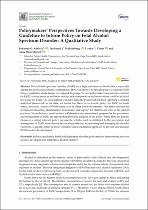| dc.contributor.author | Adebiyi, Babatope O. | |
| dc.contributor.author | Mukumbang, Ferdinand C. | |
| dc.contributor.author | Cloete, Lizahn G. | |
| dc.date.accessioned | 2023-06-02T09:50:49Z | |
| dc.date.available | 2023-06-02T09:50:49Z | |
| dc.date.issued | 2019 | |
| dc.identifier.citation | Adebiyi, B. O. et al. (2019). Policymakers’ perspectives towards developing a guideline to inform policy on fetal alcohol spectrum disorder: A qualitative study. International Journal of Environmental Research and Public Health, 16(6), 945. https://doi.org/10.3390/ijerph16060945 | en_US |
| dc.identifier.issn | 1660-4601 | |
| dc.identifier.uri | https://doi.org/10.3390/ijerph16060945 | |
| dc.identifier.uri | http://hdl.handle.net/10566/8995 | |
| dc.description.abstract | Fetal alcohol spectrum disorder (FASD) has a high prevalence in South Africa, especially
among the poor socioeconomic communities. However, there is no specific policy to address FASD.
Using a qualitative study design, we explored the perspectives of policymakers on guidelines/policies
for FASD, current practices and interventions, and what practices and interventions could be included
in a policy for FASD. The data analysis was done using the Framework Method. Applying a working
analytical framework to the data, we found that there is no specific policy for FASD in South
Africa, however, clauses of FASD policy exist in other policy documents. Preventive services for
women and screening, identification, assessment, and support for children are some of the current
practices. | en_US |
| dc.language.iso | en | en_US |
| dc.publisher | MDPI | en_US |
| dc.subject | Public health | en_US |
| dc.subject | Fetal alcohol spectrum disorder | en_US |
| dc.subject | Women | en_US |
| dc.subject | Social development | en_US |
| dc.subject | Disability | en_US |
| dc.title | Policymakers’ perspectives towards developing a guideline to inform policy on fetal alcohol spectrum disorder: A qualitative study | en_US |
| dc.type | Article | en_US |

